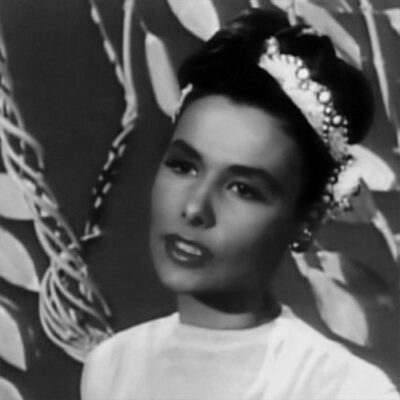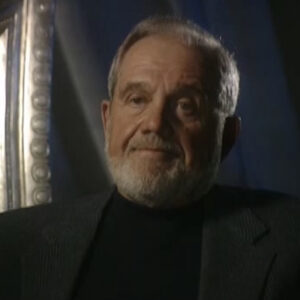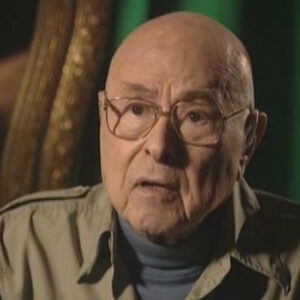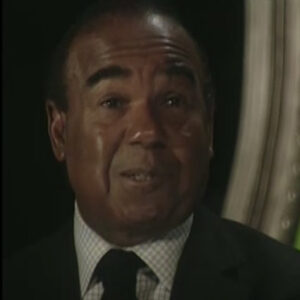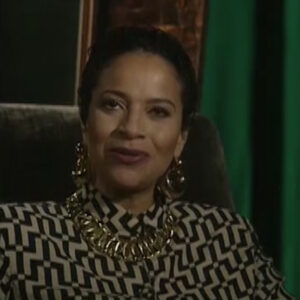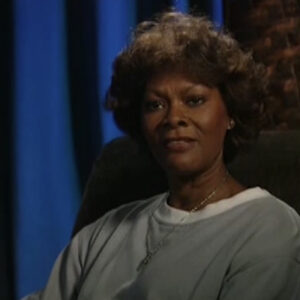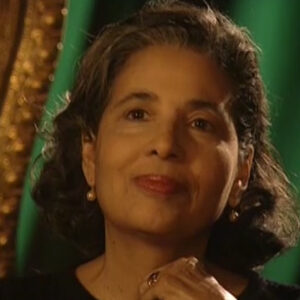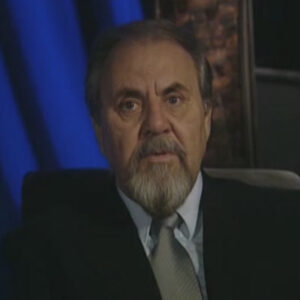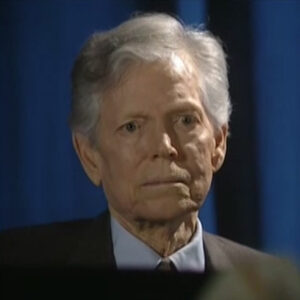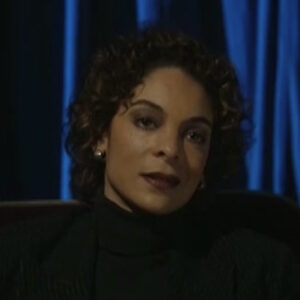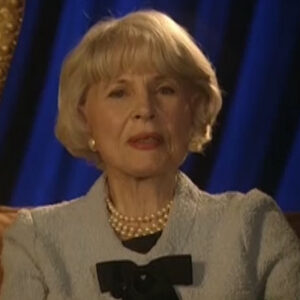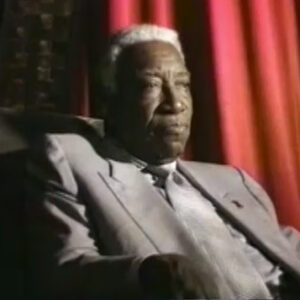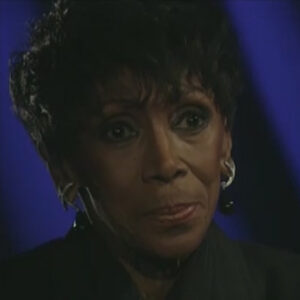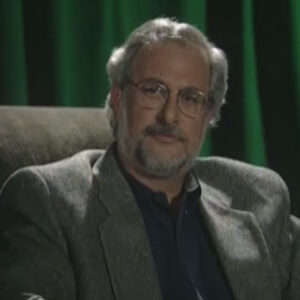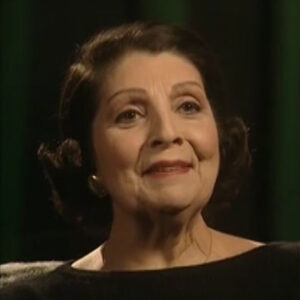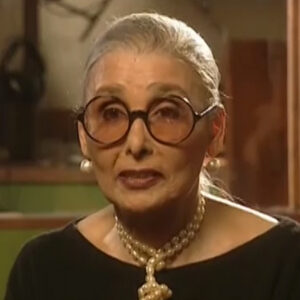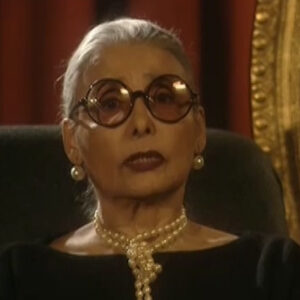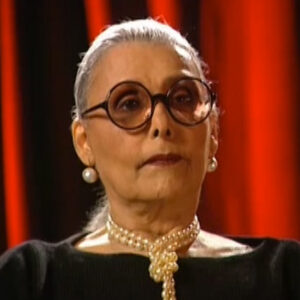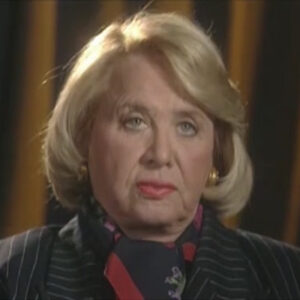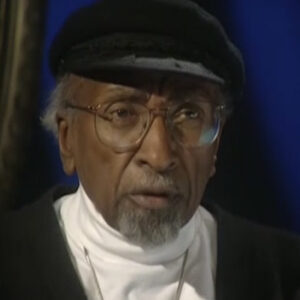Speaker Well, Lena Horne was a very glamorous movie star, and, of course, we had no movie stars at that time.
Speaker So this was something that you heard about and, you know, you heard your parents talk about. And my grandmother would only take me to the segregated movie House to see Lena Horne. She felt that this was all right, that I could be segregated because it was much more important to see Lena Horne. So I grew up thinking she was a larger than life person. And later, when we became friends, I never could get over the fact that this was the icon that I had grown up thinking, you know, was larger than life. And certainly no one that I would ever meet.
Speaker Let’s talk about this first. Meeting in Jamaica, if you could just set the scene for me, because you tried a few times, it didn’t quite make it.
Speaker That’s right. I had I was elected a national president of Delta Sigma Theta, a public service organization.
Speaker And Lena Horne had been voted in as an honorary member and she hadn’t answered the correspondence. So at the first board meeting, I was told by the national board that were you and Patricia Roberts, Harris will have to go to New York and you will have to extend this invitation personally. Well, the two of us came. I lived in New York. Pat lived in Washington. We came to went to the theater and we went the first time and got cold feet. We figured, well, she may throw us out now. Mind you, the two of us were young professionals and we thought pretty highly of ourselves. But nevertheless, we were intimidated by the whole job of having to extend this invitation. So we went, I think, about three times and finally we got up enough nerve to go backstage. And when we went backstage, the man at the desk said, well, is she expecting you? And before we could answer, fortunately, Lena heard our voices and she yelled out from the dressing room, who’s out there?
Speaker And he said, Well, these are two young ladies and they they want to see you. And she said, send them in. And so we went into the dressing room and sure enough, she had never received the invitation.
Speaker And she scolded her husband and Ralph Harris, her manager, and said, you all don’t know anything about the black community. Don’t you know this is quite an outstanding organization. You should have shown me the invitation. So that’s how we first met her and she was not intimidating at all.
Speaker OK, I need you on had been voted in as an honorary member.
Speaker I’m sorry. Could you say ok, ok, ok. OK.
Speaker When I was elected president of Delta Sigma Theta, my first job was to go to New York, go to Jamaica and extend an invitation to Lena Horne to become an honorary member of the organization.
Speaker I’m sorry, that’s you.
Speaker Because when you say go to Jamaica satellite, go on to the queen, to the country, OK. All right. OK, so you’re basically going to go see my mom.
Speaker Well, when when Lena Horne was appearing on Broadway and the musical Jamaica, we extended Delta Sigma Theta, extended an invitation to her to join the organization as an honorary member, and the organization never received an answer. When I was elected national president, the organization’s board of directors said you and Patricia Roberts Harris will have to go to the musical Jamaica and go backstage and extend this invitation personally.
Speaker Well, Patricia Roberts, Harris and I were not very timid people, but we were totally intimidated by this job we had been given. So we we actually sat through that musical, which was a fabulous musical. So we didn’t mind that. But we sat through it three times before we got enough nerve to go back stage and extend the invitation. And we almost didn’t get backstage because the stage door man said, well, what are you doing?
Speaker Is she does she expect you? And before we could lie and say yes. Oh, Lena heard our voices and yelled out, who’s out there? And he said to young ladies who want to see you. And for some reason she said, well, send them back. And so we went backstage and she was most gracious and friendly. She wasn’t intimidating at all. And she accepted the invitation and scolded her husband and manager and said, I keep telling you, you don’t understand anything about the black community. This is a very distinguished organization. You should have shown me the invitation. And that’s how she became a member. And we became friends from then on.
Speaker What, though, what were the things you have in common that allowed you to forge such a good friendship?
Speaker She’s she’s very shy, but she has a sparkling intellect and she is, I think, one of the brightest people I’ve ever known in life. I mean, she’s an omnivorous reader and she works The New York Times puzzle, I think in about five minutes. I’ve never seen anybody work on New York Times puzzles as fast as she does. And she also has a very lively sense of social consciousness. And that, I think, is what attracted me to her. I thought she had a fabulous mind and and she was she would just soak in information even though she was in show business. And I was a professor, you know, hopefully a scholarly kind of a person. That was that was an immediate meeting of the minds. And it was that thick, her sparkling intellect that attracted me to her.
Speaker And did you know her family?
Speaker I got to know her family very well, her her daughter Gail and her son Teddy and of course, I knew her husband, Lenny.
Speaker Later, I met her father and I met her mother. And I knew her uncle, I guess.
Speaker Yeah, I know most of her family well, you know her family well.
Speaker My grandmother, who took me to see her in the movie movie house, knew her family over in Fort Valley, Georgia. Her uncle was Dean over at the college there. And you remember the middle class African-American middle class was much, much smaller then. And you practically knew everybody who was achieving and and the few fields that we were allowed to enter.
Speaker So names in Chicago and Detroit or whatever were known all across the United States. So my my people knew her people, some of her people. So that also was an entree to friendship.
Speaker Now, tell me how you got involved with this.
Speaker Well, when I was national president, it was right in the middle of the civil rights revolution. Well, just just before the passage of the civil rights legislation. But it was during the sit in period freedom ride period. And I would just ask her, come on, you have to go with us. We’re going to go down to Alabama. We’re going to participate in this rally, this sit in.
Speaker And she was afraid to fly and she would say, no, I don’t think so. And she was always generous with money. She said, well, I give you all all this money and you go ahead and do it, but I just can’t fly. Well, once we went down and we face those Birmingham dogs at the barricades and when I came out of Birmingham and told her this story, something seemed to snap in her and she began to feel like perhaps she was being too selfish by not wanting to fly. And from that day on, she participated in everything we went.
Speaker We were the last person to see Medgar Evers before he was assassinated, because if you just came in over what you just saw, a ghost came in here.
Speaker No ghost came to just don’t bring a poltergeist the right thing.
Speaker I just need you to go back and just tell me about.
Speaker Facing the Birmingham jail, well, as a national organization, we were very much in the end the very center of all of the sit ins demonstrations and this and the activism of the movement. I’m sorry if you say it’s a national organization, but, yeah, as a as a national organization, Delta Sigma Theta was very much involved in all of the activism of that day and time. And always I would ask Lena to participate in rallies or go to Birmingham or Montgomery, wherever it is that Martin Luther King seemed to feel like we needed to be. And she was afraid to fly and she would say, well, I’ll give you this money. And she would always write out big checks, which was true. And she would talk about what was happening and you could tell she was simpatico. In fact, I took Martin Luther King up to her house one day and we sat around on the floor. And it was fascinating to see the two of them have a meeting of minds. So she finally decided after some of us had gone down to Birmingham and had face Bull Connor’s dogs at the barricades. And that night there had been a burning in the motel and it was all in the papers. And when I came out of Birmingham and called her, told her about this, something seemed to snap in her and she said, next time I will go. And and she and from then on, she participated in everything. She became a leading light in the whole movement. And we were we were the last person to see Medgar Evers before he was assassinated and.
Speaker Tell me about that. How did you I mean, did you get a call coming?
Speaker Well, we were always called, you know, Martin Luther King would. He would call those of us who were leaders and the national organizations and he would say, we’re going to have a rally in a particular town and can you get the members of Delta Sigma Theta to participate? Well, to me, that included Lena, you know, that included Lena O’Lantern or whomever happened to be a delta. And we would invite them. And it was Lena who finally, after she knew that we were really in the midst of of of a time when all of us had to put our bodies online, that she decided that it was she could overcome her fear of flying. Now, she still doesn’t like to fly, but she will fly if she feels that there’s something important that she has to do.
Speaker And the. This like when you saw Medgar Evers, I think you started to tell me about something that happened to you.
Speaker I’ll tell you one thing now I can’t remember.
Speaker Now, Medgar Alino, of course, is very much involved with the NAACP. Her her grandmother was one of the founders. So she’s always had a very strong feeling about participating in any event that they that they sponsor. And this was a big rally. And in Mississippi and Billy Strayhorn and Lena and the three of us went down to the rally. We can start again, you have to remember that every day there was some problem that had to be faced and always a name like Lenos would garner attention to the to the issue and to the problem. And some of the undergraduate members of Delta Sigma Theta who were Freedom Riders called in and told us that they were being given vaginalis examinations by trustees and some of the Mississippi jails.
Speaker Now, these were political prisoners, so they should not have had to undergo all of this. So I called Lena and I said, do you know what’s happening? And I told of a story. She said, well, we’ll just have to call any dubea and call all the television stations. She got right on that radio and she people were calling from all over because she told the story.
Speaker She you know, she said to the American public, this is a shame. This is a disgrace. And so she helped to publicize this. Then later on, she we went to see Robert Kennedy. He gave us some excuse about how they have to examine prisoners no matter what. But nevertheless, they stopped doing that. And I’m sure it’s because Lena and some of the others who she attracted to the issue made this something that Americans could see was not appropriate, not even for youngsters who were trying to get rid of segregated laws.
Speaker Tell me about the night with Medgar Evers.
Speaker Well, this was a big, big rally. I think it probably took place and a high school that was these rallies took place and high schools are and and churches. And Lena spoke at this rally. It was just packed with people. She spoke at the rally and Billy Strayhorn played the piano and she sang this little light of mine that night beautifully. And then we went to probably dinner to Megas house afterwards. Then we went back to whatever motel or wherever we were, no motel.
Speaker We probably were staying in somebody’s house. And it was in the night that night that that he was assassinated. But we did not stay at his house.
Speaker We were somewhere else in the community.
Speaker Do you remember?
Speaker Lehman’s response when she heard about it while she was, you know, angry.
Speaker And upset, I needed to preface that when I went when when Lina heard about this, she was crying and angry when I heard about it.
Speaker OK, well well, when Lina heard about Medgar Evers assassination, she was enraged. She was angry and, you know, and crying and more determined than ever to use whatever influence she had toward the rhythms of segregation. So that was a very moving experience to have just been there and, you know, hugged them and, you know, socialize with them after this great rally. And then for him to be assassinated like that, what was he like?
Speaker What was Medgar like? Sweet, you know, bright, ambitious, kindly, that kind of a person.
Speaker Medgar was sweet. Yeah, I think he was sweet. I remember Medgar Evers was I would say Medgar Evers was Medgar Evers was a sweet soul.
Speaker Kindly, gentle.
Speaker Well, of course, he was a determined freedom fighter, as the rest of us were, but that was a deep sweetness about him.
Speaker Did you connect with Merrily Merrily was.
Speaker Kind of armor and the shadows somewhat, I didn’t get to know her until later, and Lena got to know her later in life, but not at that time.
Speaker Oh, when Lina saying. This little reminder that she speak at this rally, too.
Speaker Oh, yes, she’s a fabulous Lena Horne is one of the most outstanding orators you would ever need to hear.
Speaker No, no. She’s she makes speeches and then she sings. Yeah. She probably would rather make speeches.
Speaker On this night, go on this night when she was singing this little light of mine and Billy Strayhorn was he played. Yes. No, you just tell me a little bit about how the audience responded. Oh, the chair.
Speaker Well, the moment she stood up, you know, the people just went wild. I mean, this woman is a very special African-American icon. It’s very hard to to describe the passion she brings out and people of all ages. And it was wonderful to see when she came to Broadway with Lena, the lady and her music, to see so many young people come into the theater. And they had been following her on television and listening to her music. And then they’d heard the stories told to them by their mothers and and the grandmothers about her early days and in Hollywood.
Speaker So she she whenever she appears, people scream and yell and holler, which is exactly what they did that night.
Speaker And it gives a whole sense of of of motivation to people who don’t mind got well, I shouldn’t say they don’t mind going to jail, but the people who were on the front lines, who were putting their bodies online every day seemed to get a lot of motivation from being around Lena.
Speaker Now, I wrote the article about the two of you wrote.
Speaker Yes, for good in this arena talks about the whole class division.
Speaker I mean, do you feel that Lina was feeling?
Speaker As though maybe some folks thought that she thought she was too good for this.
Speaker The clash among black folks over color.
Speaker Oh, yes, right, and the fact that she married a white man.
Speaker Yeah, that that got on a whole lot of people’s nerves, I think.
Speaker Remember now, Lena was though she dropped out of high school, but she probably has the mind of a Ph.D. But nevertheless, she did formally drop out of high school. But she comes from a family that had always placed great emphasis on education.
Speaker Her grandmother and then her her uncle, her uncle Frank was a very respected intellectual.
Speaker And I think that one would say that she grew up bourgeois. And then, you know, from this bourgeois family right into show business must have been quite a change for her because, you know, the lifestyle of a person in show business and those days certainly was not the kind of lifestyle Middle-Class Black African-Americans lived. So I’m sure there was some strain there.
Speaker But she say more about this class.
Speaker What’s. The whole division between, you know, when folks say you’re bourgeois or you’re abusing, that has a certain meaning.
Speaker Mm hmm. And what do you feel?
Speaker Was was there stuff I can’t promote because I’m trying to.
Speaker Oh, well, remember that. Lina was a symbol of black achievement. I don’t know that she was so much a symbol of bourgeois blacks, I think bourgeois blacks understood her from from the point of view of having had this very distinguished middle class upbringing and then moving from that to show business. And her father had who was absolutely attractive person.
Speaker This was you know, you could understand where Lena gets a lot of her charisma if you if you had known her father. But he she will tell you herself that he was in the numbers business and he did some things that bourgeois blacks would not have condoned.
Speaker So there was a lot of tension around bourgeois blacks accepting linas marriage to to to learn to hate.
Speaker And, you know, they wanted to claim her and keep her in the bosom of respectable blackness. And of course, she started out like that because her first husband was black. But the masses of black people just turned on to her as a superstar. They were involved and thinking whether she thought herself to be better than anybody else. She never came across like that. You know, she always comes across with a lot of humility. So I don’t think there’s ever been that much tension shown by by the masses of uneducated blacks. They just accepted that here was this beautiful young woman who went to Hollywood and refused to play roles as maid as the as maids cleaning women. And they were just even though she would only have a bit part and some of those big MGM classic films, they would just go down to the theater to see that this breakthrough, this woman that’s cleaning and singing, you know, clinging to some column and singing this beautiful song and a gorgeous dress. We have never had role models like that. So they related to that.
Speaker I never will forget the glow on Medgar Evers face when Nina started singing this little light of mine.
Speaker And you know that it was most of the time and those rallies a person was saying one line and then everybody and the church and the congregation would begin to sing and the whole place would rock. But that night, there was something very special about the music Lena and Billy Strayhorn made together. I didn’t even know they had practiced it all. I was surprised myself. I said, Oh, well, they came with us this song, and it was so moving because the whole place stayed very quiet while she sang it and none of them joined in. When it was finished, there was this great silence, as if people were getting close to us, kind of spiritual closure for the evening. But Medicare’s face, I will always remember the great glow. And I hope that, you know, he was at least feeling somewhat happy even later on when he had to face death. Let me say something else about Betty Comden and yeah, what was so special about Lena was that she brought in many allies for the cause and sometimes I think these days young people don’t realize that that’s an important obligation of leadership to make allies for the cause.
Speaker And she had many, many white friends, of course. And Betty Comden and and Green wrote a song. And that night and in Mississippi, I think is very common at all.
Speaker OK, I forgot.
Speaker OK, but Betty Comden and Adolph Green wrote lyrics for the song Now, and Lena sang that song at Medgar Evers rally in Mississippi. And people liked it a lot. And and then she sang it and it was on a record and they banned it in many southern cities. They would not play that song. They played it, of course, in New York and they played it in Chicago and Detroit.
Speaker So she was able to move in many circles of people and make allies for the cause. And that was helpful. She could raise money and she herself could speak or sing, but she also would she’d hit on her friends to help the cause.
Speaker During that time. Now, do you remember her response when Malcolm X was killed?
Speaker I remember that I had never thought of reading that book until Lena Horne called and said I just finished reading this fantastic book, Malcolm X, in my mind being, I must confess, you know, kind of bourgeois. You know, I didn’t know what I was going to like. This person named Malcolm X. She read the book before any of the rest of us did, and she just thought it was.
Speaker You know, next to the Bible and she made all of us read it and we did, and of course, we all also agreed that this was this man was a leader to be reckoned with and someone we should take very seriously to heart. I don’t remember where she was when when he was assassinated. I do remember her at Martin Luther King’s funeral because we were all at that funeral and I remember that.
Speaker Tell me about that. Well, everybody was so sad and we all went from different parts of the United States wherever we I think she was at that time in California, and everybody flew in to Atlanta for the for the funeral. And there was an awful lot of grieving and and consternation and a feeling that we were now going to be leaderless. But by this time, Malcolm X was also considered to be a joint leader in the movement. So that was no controversy about that. Not I’m not among people Lynagh associated with.
Speaker Now, she’s often talked about this period is the time she really came into herself where she could really reconnect with her real roots.
Speaker Oh, all the time. Yeah, it was during this time during the during the movement time when she made the decision to spend most of her volunteering time in black causes. And this was very deliberate. Now, she had already made some decisions, like not appearing places where blacks could not sit in the audience. But remember where Lena Horne perform. If I hadn’t been her friend and could stand on the side as a professor, I could not have afforded to go to the Rainbow Room and all these places, these were most expensive places. So how many blacks could even afford to see her, even if they dropped all of the segregation bans? And she became very conscious of that. She became conscious of the fact that if she was going to identify with African-Americans, she had to move out from these very, very posh, expensive places to venues where they were. And that’s what she deliberately set out to do. That’s when she moved back from California to New York, because I think she felt New York was a much more activist center and that would not be all of the Hollywood distractions here in New York City. And I think that’s why she moved back here.
Speaker Now, she has talked about having. A hard time.
Speaker Getting Lenny to understand her rage as a black woman.
Speaker Well, that’s understood. It’s understandable that she that she would have a hard time making any of her white friends and certainly her husband understand this deep rage that we all were experiencing during the civil rights movement.
Speaker And this was something that she just had to to work through. She it was very painful for her to go through this period. And Lenny was a beautiful person. I mean, he was a pure musician. And I believe he didn’t have a prejudiced bone in his body. But that kind of passive acceptance of self, of of blacks was not what Lena felt she wanted at that time in her life. She wanted to be involved with people who were screaming and picketing and being very vocal about what was happening to blacks in the United States. And that was not his personality at all.
Speaker Did you know Gail Anthony?
Speaker Yes, indeed, I knew them. I know I know Gail very well now. And I certainly knew Teddy. He died so young. Such a beautiful, bright young man. Both of them were brilliant students and very talented. And his death crushed all of us. For him to die so young was such a, you know, so much that he might have contributed. Well, of course, Gail is a very distinguished writer, as you well know, and she has a beautiful family.
Speaker Did you one of the things that Lena called Teddy was you on the water or what was it about Teddy that.
Speaker Well, I think she called Cheney a young warrior because he took very personally all of the problems facing African-Americans. He was very vocal about every every part of segregation. And had she not herself coming to maturity around those issues, he would have forced her there because he was really, you know, very militant. And she’s militant, too. But Cheney was like five times more militant.
Speaker She felt that she learned a lot. From Terry.
Speaker I would I would imagine when you have children. Who are expressing their disappointment? Daily.
Speaker They are bound to educate you, they’re bound to help you to to grow. And she also learned a lot from the young dancers and actors and and the musical Jamaica. I mean, Jamaica was a wonderful gathering of some of the most brilliant African-American dancers and singers that you would ever see ever again in history, because it was the first really big musical on Broadway. So people like Alvin Ailey and and Ossie Davis, all of the all of these people who went on to become individually excellent were in court in the chorus of Jamaica. So that was a watershed experience. And she learned a lot from and she they like to hang around her dressing room. And Lena in those days gave great parties, wonderful parties, because her husband, Lenny, was a good he was a good social animal. But at these parties would be all of these young dancers and singers and actors and actresses. And it was almost like a renaissance, another renaissance. And she was at the apex of this. She was the the whirling center of all of this artistic activity. And she learned a lot from them. Because they would tell her, you are a superstar, you don’t know what it means to stand on line and try to to get a job as an actor, and she hadn’t thought about all of that too much.
Speaker Did she ever expressed disappointment to you that she thought Jamaica was going to be like the opening? Of this young black talent that nearly went on to be business as usual. Well.
Speaker Jamaica was an opening for a good number of very fine actors and dancers, I can think of at least 20.
Speaker Persons who are who distinguished themselves and were able to make a wonderful living from show business use the term show business.
Speaker Let me ask about Gale for a moment, we talked about Tim. Go home and Teddy, that you’re the teddy didn’t really live with me all the time, and that seemed to be a source of pain for oh, that was a very deep source of pain.
Speaker Of course, I didn’t know her during the time when Teddy was a small child. When we became friends, Teddy made the decision to come and live with his mother S.. So so I came. And just when their relationship was building into something very, very beautiful, because he was then, I guess, six, 18, 16, he was old enough to make that decision. And he chose he he went to Columbia University and Gail went to Harvard.
Speaker And that was that was the order of the court that his father would have him and she would have Gail. And that has always broken her heart. She wanted both of them. Naturally, she wanted and she would she would go and get him. And sometimes she’d have a very difficult time even getting visitation rights. But he made the decision himself to come and live with his mother.
Speaker So they had about, I guess, three or four really beautiful years before he became so ill.
Speaker Now, I understand his illness was just one of these sort of gradually decline.
Speaker That must have been well, probably today he wouldn’t he would still be alive. He would probably have a kidney transplant. And they did everything, everything. She even bought the machinery so that he could have to go off.
Speaker And I can’t.
Speaker Across the name, huh? Right. Lina Borodai, one dialysis. Yeah. Linebaugh, a dialysis machine.
Speaker And Terri wouldn’t even get on the machine. You know, he he was naughty. He would not follow all of the medical instructions. And that was his choice. He you know, but she had done everything. He’d been all over the United States looking for a cure. So he just gradually died because I think he would not get on that machine when he should today. I’m sure he probably would have lived much longer.
Speaker And now and her father was ill at the same.
Speaker Her father.
Speaker What did he have? He has emphysema, right?
Speaker Mm. So what was that we were sort of we did during that time while she was trying to take care of her father and so.
Speaker Retreat from war. What do you mean? Well, basically from being out there in life, did she just tell me that?
Speaker Well, Lena has had some terrible blows in her life, she’s had some real tragedies. Enough tragedies to fill in a strong person. And I think the loss of her son Teddy and then her father was ill with.
Speaker It was a strange I heard it myself and.
Speaker Lena Lena has had some real tragedies in her life, and she doesn’t like to talk about them and she doesn’t like that much sympathy, but when you consider that she lost this beautiful son of hers when he was in his early 20s and that she lost a father whom she loved very, very deeply all around the same time. And I think around that time, probably she was going through a divorce with Lenny. Then I think she did go through a period when she kind of withdrew to herself. And stayed out of the public eye more than she had in previously, do you remember when he died?
Speaker Because when her father died, then learned that Teddy died, then learned that, hmm, her father died. Teddy died.
Speaker Oh, the short period of time, right? Yeah.
Speaker I know Frank Sinatra called her and told her that when I was in the hospital and then she flew out to be with him, I remember from there that she she told me that Lenny looked up at her when he was dying and he said.
Speaker It’s OK.
Speaker They had a really very special relationship. And he he contributed so much to her musically as well. Well, so did Billy Strayhorn or she loved Billy Strayhorn very, very much. They were very kindred spirits. But so that relationship and Lynnette’s relationship, they probably had more influence on her music. But I mean, I’m not qualified to talk about that.
Speaker But from where I stood, I could appreciate the musicality and I could certainly. Who couldn’t appreciate Billy Strayhorn.
Speaker So please, I just want to hear those her.
Speaker Frank Sinatra calling or flying out. OK.
Speaker I told you that I remember that she the Lena told me that Frank Sinatra had been a very good friend to Lenny and when he became so very ill at the end, Frank called Lena and told her that he thought that Lenny was, you know, terminal. And of course, she got right on the plane and and went out there and was with him when he died. I remember that. She said to me that he looked up at her at one moment and said, it’s OK.
Speaker It’s all right. As if, you know, he was.
Speaker Bringing a closure to his life that he wanted her to be involved in.
Speaker OK, I’m sorry, I just needed you to go over one other thing, OK? Um. When you talked about, you know, a lot of tragedy in her life. Mm hmm. And.
Speaker Hmm.
Speaker Well, Lena has had many tragedies in her life, and three seem to come at the same time, her first she lost her.
Speaker I can’t remember the sequence, but in rapid order, she lost her son, her husband and her father. And these all three men were significant in her life.
Speaker And I think that probably influenced her in such a way that she retreated a bit from from public, from public life. Other than performing, she always performs.
Speaker Her mother was, I think, a kind of quixotic figure, and Leanna’s like her mother wanted to be an actress herself and probably would have been a fabulous one had she lived in another day and time. And our mother, I think you see, Lina really never wanted to go into show business. This was not something she wanted to do. I think it probably took her many, many years to really feel wonderful about being such an excellent performer and and to appreciate all the positiveness associated with being in show business. She remember remember, she would be totally influenced by you ought to grow up and be a teacher, that kind of middle class thinking which the rest of us were reared with. And a minute she will tell you that I should have been a teacher and she would have she would have made an excellent teacher. But I’m glad she’s not a teacher. I’m glad she did exactly what she did do. But her mother, she thinks I think she blames her mother.
Speaker For putting her in show business too young and that she had to drop out of school and not be with her friends.
Speaker And to be and what at that time would have been a kind of iffy.
Speaker Occupation today, you know, we look up to basketball players and people in show business and we all think that they’re, you know, the best thing since sliced bread. But back in those days, you know, if you were in show business, people did not necessarily. Give you the same accolades if the middle class didn’t. So I think she probably had a feeling toward her mother that you ought not to have done this to me.
Speaker Her mother seemed not to be.
Speaker I never knew I didn’t get to know her mother that well, I’ve certainly been around a mother a few times. She was a very pretty woman. And. Very self-contained, I don’t remember any deep affection between the two of them, I think the affection was between Lena and her father. That was a very special affection. But I never saw that much warmth. I mean, she certainly cared for her mother and took care of her mother beautifully to the very end. But I don’t think that that the affectional base was anywhere near that, as near near near the base she had with her father.
Speaker Well. With the difficulty that Lina had with her mother.
Speaker How do you think she was able to forge a relationship with Gail?
Speaker I have a cat, but she had a great relationship with a grandmother, she never, ever, under an African-American family life, never, ever underestimate the relationship between a grandmother and a child. Sometimes I think that’s even more important. And she had a great relationship with her grandmother. Now, her grandmother seemed to have been very stern and demanding, and perhaps that was a good thing because Lena is a perfectionist in her own occupation, you know, and and as a performer, she wants everything to be just right and perfect. I admire that about her. So her grandmother’s discipline was always an influence. And she of course, when she was rearing Gail, that must have been very difficult because she was trying to make a living and then in show business with late hours and all that. But she gave Gail the very best. Gail went to the best schools. She she graduated Harvard summa cum laude. I mean, yes. You know, so she’s had a wonderful upbringing. But I think if she had to use a model, she would not have used the model of her mother. She would have used her grandmother as a model for bringing up a child.
Speaker Lina was performing at the Howard Theatre, and as was our custom, we would go backstage and ask all the artists to come up to Howard University and speak, and we went backstage to ask her and somehow she heard us out there in the hall and she yelled out, tell them I can’t come up there because I never graduated from college.
Speaker And that’s struck me because I couldn’t understand why that was so important.
Speaker Even then, I couldn’t understand why she was placing so much emphasis on that because I thought what she was doing was just as good as going to college. So I guess maybe that after that, I would have always been a little bit leery about asking Miss Horne to do anything. I soon got over that.
Speaker Well, just about two moments before you got over that, you and Pat Roberts Harris were scared.
Speaker Yeah.
Speaker The one thing you had mentioned to me over the phone and I forgot to get that from you, would you tell a story?
Speaker That was more frightening when you were in New York.
Speaker If you could just yeah, just start with a story of just start where, you know, Pat and I were afraid we were here and I was afraid to go back stage fright this morning.
Speaker Yeah, OK. Well, when the national board gave this assignment to Pat Harris and me, we were somewhat nonplussed because they had never done this before that we knew anything about. And why this big deal that we would have to go to Jamaica and issued this invitation personally. And it was the first job that I was given as the national president. And so I didn’t know why I had to do this. And I was scared to do it in the first place. But Pat Harris was more frightened. And I don’t know why, because if you know her and her place in history and she is a very take charge woman, but I think I might have ventured out the second time we saw Jamaica, but Pat would say, no, I don’t think we’re quite ready. I don’t think we should go. We don’t know where to go back there.
Speaker I was a New Yorker and I had already seen Jamaica. And I, I was I was from a little town in Georgia and a country girl, but I was at least more sophisticated than Pat was. But we were both intimidated. But she was even more so. She really was frightened of her.
Speaker I just need you to tell us what was going on.
Speaker Well, you know, if you can imagine that someone would be so frightened who one day would be the first African-American woman to be named an ambassador to a country to head to departments in the Carter administration, HUD and the Department of Health, Education and Welfare, then it’s kind of funny to consider that she would be so scared.
Speaker Is there anything else that you can think of, the other stories that.
Speaker I think you’ve covered up practically any stories like about. Her for what, hear what made her mad, I’m sure, right away.
Speaker Well, she’s a perfectionist, that’s she, and she doesn’t suffer fools very gladly. You know, I mean, if you win, if you’re in her house, you will see boats stacked in every direction. I mean, there’s almost nothing that she doesn’t read. And she’s a she doesn’t sleep very much so. So she reads all the time and she watches everything on on television. So she’s up to date on every issue that’s imaginable. And so with that kind, I think that a person with that is that bright would almost always be.
Speaker A little tempered by people who get to do what they’re supposed to do on time, and I think, yes, I’ve seen a loser temper around situations where people have not produced what she thinks she needs in order to be as perfect as possible on that stage. And she is, you know, as perfect as a performer and artist can be on that stage.
Speaker Well, she was sort of almost forced into being perfect, but having to be this role model, right? Absolutely. One of the things you said to me over the phone that she did say to you, explain why you said it, is that you didn’t know anybody who was more concerned with being respectable than you know.
Speaker Oh, yeah. I like to tease. I used to tease her a lot. I said, you have a respectability syndrome.
Speaker And that’s that, I think is because she she feels like show business was not a respectable occupation for someone of her background.
Speaker So there’s always been that tension so that, you know, I don’t think I ever smoked did anything. She just was always, you know, tied in to being totally respectable. It’s not phony at all. It’s just that, you know, she her grandmother’s training is almost always with her.
Speaker So she was very concerned with her image.
Speaker No image or just being good.
Speaker I’m not you know, and all these years, I have never, ever heard her even use terms like image. You know, she she she she doesn’t live that kind of a life.
Speaker She doesn’t run around with a whole lot of people in show business. Like I say, she likes to read and she likes to to be with people that that she feels comfortable with. And I’m sure that she could be in in The New York Times social column daily because she’s well sought after, you know, for everything. But but that’s not that doesn’t appeal to her at all. Lenny used to like a lot of famous people in his life, and they were always loads and loads of famous people at her parties when Lenny was around. But then when he wasn’t around, she didn’t give those kinds of parties anymore. What was going on back in the party, lots of fun, we used to do the slop and all those dances and whatnot, you pull a rug back and and dance all. And it was the twist, the slop during the during the partying time. Well, when she had when she lived on West End Avenue, she and Leonard would give these huge parties. That also was a time when all of these dance steps came in. And so we would be up there dancing all night, all of these, and she and she’d be right in the middle of it, you know. We’ll talk about her shyness. Her shyness. Well, I don’t know that she is so shy as she is more reserved. That’s a difference, you know. I think that she’s very reserved and she’s very considerate of people. And she’s I guess she’s shy in comparison to the images we have for people and her on her own, her level or status level. And we tend to see them as almost pushy. And she is just the opposite of pushy. I’ve been with her when, you know, people have pushed all over her and she’s totally gracious to the man. During the run of Lean On the Lady and her music, she would stay backstage and and shake every hand night after night after night. And she’s certainly not shy with her fans, but I think reserved as much is a word I would use and I would not use the word shy, because whenever she’s involved in a conversation, there’s there’s no shyness there. She you know, she can argue with you, a debate with you or discuss with you with with anybody from Martin Luther King. On to President Kennedy. She’s not shy.
Speaker That’s what I meant to ask you, you, me, about that Martin Luther King Day.
Speaker You know, we were all sitting on the floor.
Speaker What was that?
Speaker What he was talking about?
Speaker Just like Martin Martin Luther King that night was talking about Gandhi.
Speaker And he went when he was in a private place like that. And he would he did an awful lot of talking. So that night was the first night, I think both of us had heard him really expound on his his theory of nonviolent demonstration. And remember, now, Lena had also been appealed to by the youngsters and snake so that they and of course, they did not care that much about nonviolent techniques.
Speaker So she was always pulled in that direction and she helped them a lot. But she she believed and and and nonviolent she believed in Martin Luther King’s philosophy. And that that was the night, you know, he just went on for hours. Yes, I remember. Now, when Ozzy comes, he will tell you about their meeting with Bobby Kennedy, right. It didn’t he say he would? Yeah, OK. I was not at that meeting with Lorraine Hansberry and. Right.
Speaker You know, I’m curious to tell you, did she tell you about that meeting? I have to think about that meeting.
Speaker When did she tell me about. Oh, yes. She told me about it. She tell you about this? She couldn’t believe him.
Speaker She couldn’t believe she could not Lena could not believe the naivete of Robert Kennedy.
Speaker She definitely could not believe that this man could be an American and be in such a high position and not know anything about black people. And when he said something to them about you, I guess he must have come across as he will tell it better, but from her, I gather that he came across lecturing them as to what they should do about these youngsters who should be doing something different, Stokely Carmichael and the rest. And she was furious. And they all scream that at at the attorney general, I think they all just hit him verbally with everything they had going and said, what do you mean telling us what we should be telling Stokely Carmichael to do?
Speaker These young people have sincere grievances and you need to address them. Don’t tell us how we should stop them from organizing and demonstrating in the streets.
Speaker But she was shocked that his naivete.

